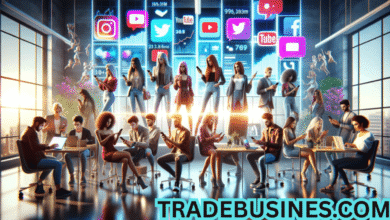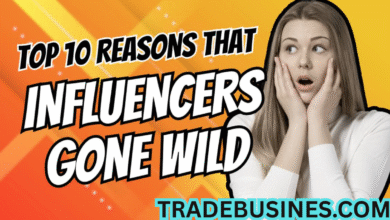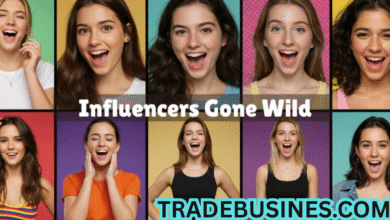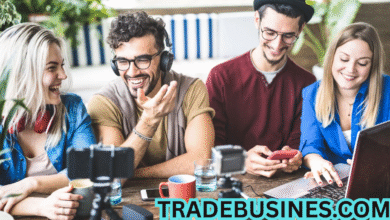Influencer Gone Wild In the modern era of social media dominance, the term “influencer gone wild” has emerged as a provocative and often controversial phrase. It encapsulates moments when influencers, individuals who have built substantial followings on platforms like Instagram, TikTok, YouTube, and Twitter, engage in behavior that defies expectations, violates norms, or ignites public debate. These incidents often dominate headlines, ignite online backlash, and spark conversations about the responsibilities of digital celebrities.
The allure of social media lies in its accessibility. Anyone with a smartphone and a compelling personality can build an audience. Over time, that audience can translate into brand deals, fame, and financial independence. However, with great reach comes immense responsibility, and not every influencer handles the spotlight with care. When influencers go “Influencer Gone Wild” it doesn’t always mean something humorous or trivial. Sometimes, it leads to real-world consequences and deeper discussions about online accountability.
The Evolution of Influencer Culture
The idea of influence has existed long before the digital age. Celebrities, public speakers, and thought leaders have always impacted public opinion. With the advent of social media, this dynamic shifted significantly. Now, influence is democratized. Regular people have the power to become opinion leaders, tastemakers, and trendsetters.
Influencer culture truly took off in the 2010s with the rise of platforms such as Instagram and YouTube. Content creators began monetizing their content, working with brands, and building careers based entirely on their online personas. Unlike traditional celebrities, influencers gained credibility from perceived authenticity. Followers felt they were watching real people rather than carefully curated public figures.
However, this perception of authenticity can be both empowering and dangerous. Because influencers often share their personal lives, the boundaries between private and public can blur. When influencers “go wild,” these blurred lines become even more apparent. Whether through a lapse in judgment, a controversial opinion, or reckless behavior, the resulting fallout can be swift and harsh.
The Psychology Behind Going Wild
Understanding why influencers behave wildly involves examining the pressures they face. Many influencers experience a constant need to create engaging, viral content. This pressure can lead to risk-taking behavior or sensationalism. The digital algorithm rewards engagement, which is often driven by shock value or drama.
Additionally, the parasocial relationships between influencers and their followers can distort reality. Influencers are often surrounded by people who praise them, creating an echo chamber that stifles criticism and encourages impulsive decisions. Without the checks and balances of traditional media institutions, some influencers feel emboldened to act out without immediate consequences.
Fame, particularly when acquired quickly, can also impact mental health. The sudden shift from obscurity to being in the public eye can lead to anxiety, narcissism, or a skewed sense of self-worth. When influencers spiral or “go wild,” it can sometimes be a manifestation of this internal struggle, exacerbated by external pressures.
High-Profile Incidents and Public Reactions
The internet has no shortage of cases where influencers have made headlines for the wrong reasons. These events vary in severity, ranging from public meltdowns to illegal activity or offensive remarks. What they all share is their viral nature. When influencers act inappropriately, social media platforms magnify their actions for the world to see.
Public reaction to such events is typically swift and unforgiving. Hashtags trend within hours, and influencers can lose sponsorships, followers, and credibility overnight. This phenomenon, often referred to as “cancel culture,” is both a mechanism for social accountability and a source of controversy in itself.
While some influencers manage to recover and rebrand, others disappear entirely from the public eye. In many cases, these moments serve as cautionary tales about the fleeting nature of internet fame and the power of public opinion.
The Role of Platforms and Brands
When influencers go wild, the responsibility doesn’t rest solely on their shoulders. Social media platforms and brands that partner with these individuals also play a role. Platforms like Instagram, TikTok, and YouTube profit from the attention influencers bring. However, they often struggle to enforce consistent community guidelines when those same influencers violate rules.
Brands, on the other hand, must protect their image. When an influencer engages in questionable behavior, companies are quick to cut ties. The damage to a brand’s reputation from associating with a controversial figure can be substantial. This creates a high-stakes environment where influencers are not only accountable to their audience but also to corporate partners.
Some companies have begun implementing stricter vetting processes for influencer partnerships, including reviewing past content and monitoring online behavior. These measures reflect a growing awareness of the risks involved in influencer marketing.
Ethical Considerations and Accountability
The phrase “influencer gone wild” raises significant ethical questions. Should influencers be held to a higher standard because of their reach? How much leniency should be given for mistakes or missteps, especially in an environment that constantly demands content?
Some argue that influencers, particularly those with younger audiences, should act as role models. Others believe that influencers are people too, capable of error and deserving of grace. The balance between accountability and empathy is difficult to strike, especially in the fast-paced, reactive world of social media.
Digital literacy also plays a role. Audiences must learn to consume content critically, recognizing that not everything shared online is aspirational or worthy of emulation. Influencers, for their part, must recognize the power they wield and use it responsibly.
The Impact on Followers and Society
When influencers behave recklessly, the effects ripple outward. Many followers, especially younger ones, model their behavior after online personalities. This influence can be positive or negative. While some influencers promote body positivity, mental health awareness, and social justice, others glorify excess, drama, and conflict.
Incidents involving influencers going wild can also erode public trust in social media culture. As more cases emerge, people may grow more skeptical of influencer content and the values it represents. This shift could affect engagement levels, brand investments, and the overall direction of digital culture.
Additionally, some influencers take advantage of their audience’s loyalty to push harmful products, unverified claims, or political agendas. When such behavior comes to light, it can cause disillusionment and harm public discourse.
Redemption and the Path to Growth
Despite the fallout, not all stories end in ruin. Many influencers who face backlash take steps to grow and learn. Public apologies, charitable actions, and behavior change can help rebuild trust. However, the sincerity and timing of these efforts are often scrutinized.
The concept of redemption in the digital age is complex. It depends on the severity of the offense, the influencer’s response, and the public’s willingness to forgive. True growth involves more than a PR statement; it requires long-term change and accountability.
Some influencers emerge stronger after controversy, using their platforms to educate others and advocate for better behavior. These examples show that while going wild may lead to setbacks, it doesn’t have to be the end of one’s journey.
The Future of Influencer Culture
As influencer culture matures, so too does the audience’s understanding of it. There is a growing demand for transparency, authenticity, and accountability. Influencers who succeed long-term are those who balance entertainment with ethical responsibility.
Social media platforms are also evolving. Algorithms are being adjusted, community guidelines are more actively enforced, and creators are being educated about their influence. Brands are becoming more selective, favoring creators who align with their values and demonstrate professionalism.
Ultimately, the phrase “influencer gone wild” may always capture the public imagination. But its implications can guide a deeper conversation about digital ethics, personal growth, and the evolving relationship between creators and their audiences.
Frequently Asked Questions (FAQs)
What does “influencer gone wild” mean?
The term refers to instances when social media influencers engage in controversial, reckless, or uncharacteristic behavior that garners public attention, often leading to backlash or consequences.
Why do influencers behave wildly sometimes?
Many influencers face intense pressure to stay relevant and engaging, which can lead to impulsive or dramatic actions. Fame, mental health challenges, and algorithm-driven content demands also contribute to such behavior.
Can influencers recover from scandals?
Yes, many influencers have recovered from public controversies by taking accountability, making genuine apologies, and demonstrating growth. However, the success of a comeback depends on public perception and the nature of the offense.
Are influencers responsible for setting an example?
While not legally obligated, influencers are widely seen as role models, especially for younger followers. Many believe they should uphold certain standards due to their reach and impact.
How can audiences protect themselves from harmful influencer behavior?
Audiences should practice digital literacy, question the content they consume, and avoid idolizing influencers uncritically. Following a diverse range of voices and verifying information can also help.
Do social media platforms hold influencers accountable?
Platforms have community guidelines, but Influencer Gone Wild can be inconsistent. High-profile influencers may receive leniency due to their engagement metrics, though this is gradually changing with public pressure.
Is cancel culture fair to influencers?
Opinions on cancel culture vary. Some see it as a form of social accountability, while others view it as overly punitive. The fairness often depends on the context and response from the influencer involved.




